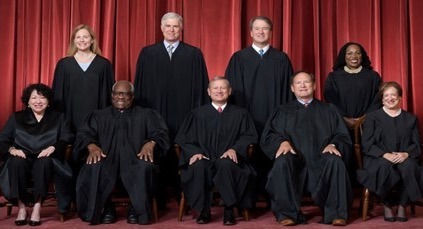Supreme Court Rules No On Affirmation Action in College Admissions
- westchestercountyp6
- Jul 8, 2023
- 3 min read
President Biden stated, “This is not a normal court,” in response to the June 29, 2023 ruling by the U.S. Supreme Court that effectively eliminated the decades long use of race as a factor in higher education admissions practices. He expressed disappointment and insisted that, “The Court has done more to unravel basic rights and basic decisions than any Court in recent history.”
The 6-3 decision, rendered along ideological lines, covered two disputes: (1) Students for Fair Admissions, Inc. v. President and Fellows of Harvard College, and (2) Students for Fair Admissions, Inc. v. University of North Carolina. Justices Gorsuch, Kavanaugh, and Thomas each penned a concurring opinion in addition to joining the majority opinion.
Justices Sotomayor and Kagan joined Justice Jackson’s dissent in the matter of Students for Fair Admissions, Inc. v. University of North Carolina. To maintain the integrity of the high Court and avoid the appearance of a conflict, Justice Jackson recused herself from the matter of Students for Fair Admissions, Inc. v. President and Fellows of Harvard College. Justice Jackson is a graduate of Harvard and Harvard Law, and served as a six-term member of Harvard’s Board of Overseers. Chief Justice Roberts, also a graduate of Harvard and Harvard Law, did not recused himself from the Harvard case. Justice Elena Kagan, the former dean of Harvard Law School, also did not recuse herself from the Harvard case.
For the majority opinion, Chief Justice Roberts wrote, “The Harvard and UNC admissions programs cannot be reconciled with the guarantees of the Equal Protection Clause”, which is included in the Fourteenth Amendment to the U.S. Constitution. Collectively, the Thirteenth, Fourteenth, and Fifteenth Amendments, also known as the “Reconstruction Amendments”, were designed to remediate the vestiges of slavery. The Equal Protection Clause provides, “. . . No state shall make or enforce any law which shall abridge the privileges or immunities of citizens of the United States; nor shall any state deprive any person of life, liberty, or property, without due process of law; nor deny to any person within its jurisdiction the equal protection of the laws.”
In a 69 page dissent, Justice Sotomayor wrote, “ . . . [T]he Court’s opinion is not grounded in law or fact and contravenes the vision of equality embodied in the Fourteenth Amendment, [which] enshrines a guarantee of racial equality. Sotomayor also cautioned that the “devastating impact of the decision cannot be overstated. The majority’s vision of race neutrality will entrench racial segregation in higher education because racial inequality will persist so long as it is ignored.”
In a 29 page dissent, Justice Jackson wrote, “With let-them-eat-cake obliviousness, today, the majority pulls the ripcord and announces “colorblindness for all” by legal fiat. But deeming race irrelevant in law does not make it so in life.” Vice President Kamala Harris praised Justice Jackson for her accurate and impactful dissent, calling it one of the “most brilliant” ever.
Vice President Harris also criticized the Court’s decision, describing it as, “A moment where the Court has not fully understood the importance of equal opportunity for the people of our country and a denial of opportunity. It is a complete misnomer to suggest this is about being colorblind, when in fact it is about being blind to history. Blind to data, being blind to empirical evidence about disparities. Being blind to the strength that diversity brings to classrooms, to boardrooms.”
Nine Justices comprise the current Supreme Court: one Chief Justice, John Roberts, and eight Associate Justices. Since its first assembly in 1790, all Justices were white until the appointment of Thurgood Marshall, the first African-American Justice, in 1967. Since then, three other non-white justices were appointed: Justice Clarence Thomas (African-American) replaced Marshall in 1991, Justice Sonia Sotomayor (Latina) replaced David Souter in 2009, and Justice Ketanji Brown Jackson (African-American) replaced Stephen Breyer in 2022.








Comments